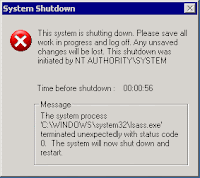 If your computer has been experiencing performance problems lately, you are likely wondering if your computer has been infected by a worm or a virus. Self-education is a great way to start when you are troubleshooting your computer. Once you understand what the possible causes of your performance problems are, you are that much better equipped to repair things and get on with your computing life.
If your computer has been experiencing performance problems lately, you are likely wondering if your computer has been infected by a worm or a virus. Self-education is a great way to start when you are troubleshooting your computer. Once you understand what the possible causes of your performance problems are, you are that much better equipped to repair things and get on with your computing life.Here is how to define a worm/virus:
1. Worms and viruses are not the same thing:
Worms and viruses are often discussed in the same breath. In fact, it is not uncommon for people to confuse the two types of computer problems. Make no mistake: while they are similar in many ways, worms and viruses are actually different. They behave differently and they infect your equipment differently.
2. A worm is a self-replicating program:
Let's start with defining what a worm is. A worm is a self-replicating (makes copies of itself), self-propagating (moves itself forward) program which is designed to harm your computer and others on the network. Of course, self-replicating means that they actually make copies of themselves and send themselves through a network of unprotected computers. Worms can act on their own and do not need to be associated with any particular computer program.
3. A virus is also self-replicating, but it needs to be associated with a particular program:
Okay, now to define viruses. A virus is similar to a worm in that it is also usually self-replicating. The difference is that a virus needs to be attached to or associated with a particular software program or file in order to "live." Unlike worms, viruses cannot spread on their own.
4. Worms almost always cause harm to the network:
Worms can wreak havoc on an entire network of computers at once. Because they are self-propagating and don't need to be associated with a particular software program or file, they can just run freely. Worms often spread by finding security holes in networks. The safer your network, the safer you are from being infected by a worm.
5. Viruses almost always corrupt or modify files on a targeted computer:
Meanwhile, viruses tend to infiltrate the computer on which a person opened an infected file or ran an infected software program. Be careful about opening any unknown e-mail attachments, and never run a file on your computer ending in ".exe" unless you absolutely trust the source.
To define "worm/virus" is the first step toward determining if your computer is infected. You then need to make sure you are protecting your computer by installing the latest firewall and anti-virus, anti-worm software.
If you believe that your computer is infected, you should take immediate steps to remove the offending worm or virus. If you take the necessary steps but still experience computer performance problems, you should consider other possible causes, such as: a damaged registry, a failing hard drive, a hard drive that is out of free space, a fragmented hard drive, or the presence of spyware.

0 comments:
Post a Comment